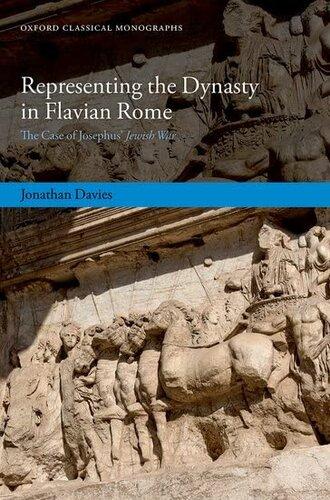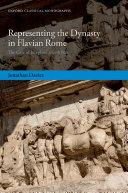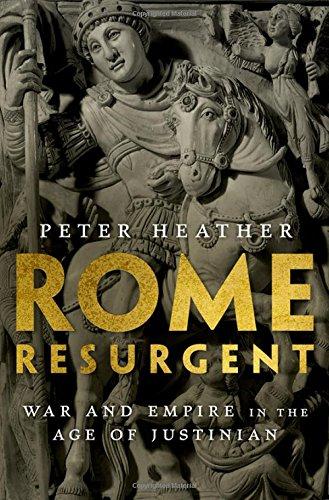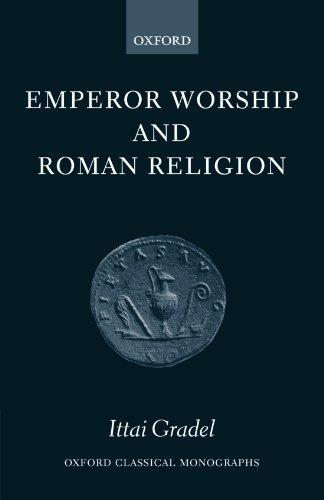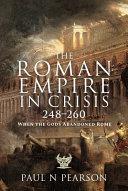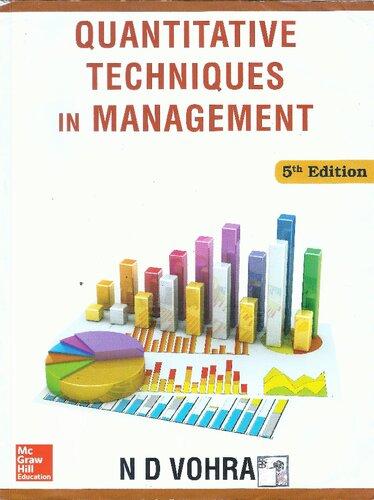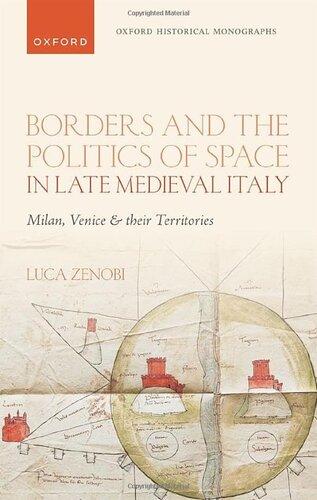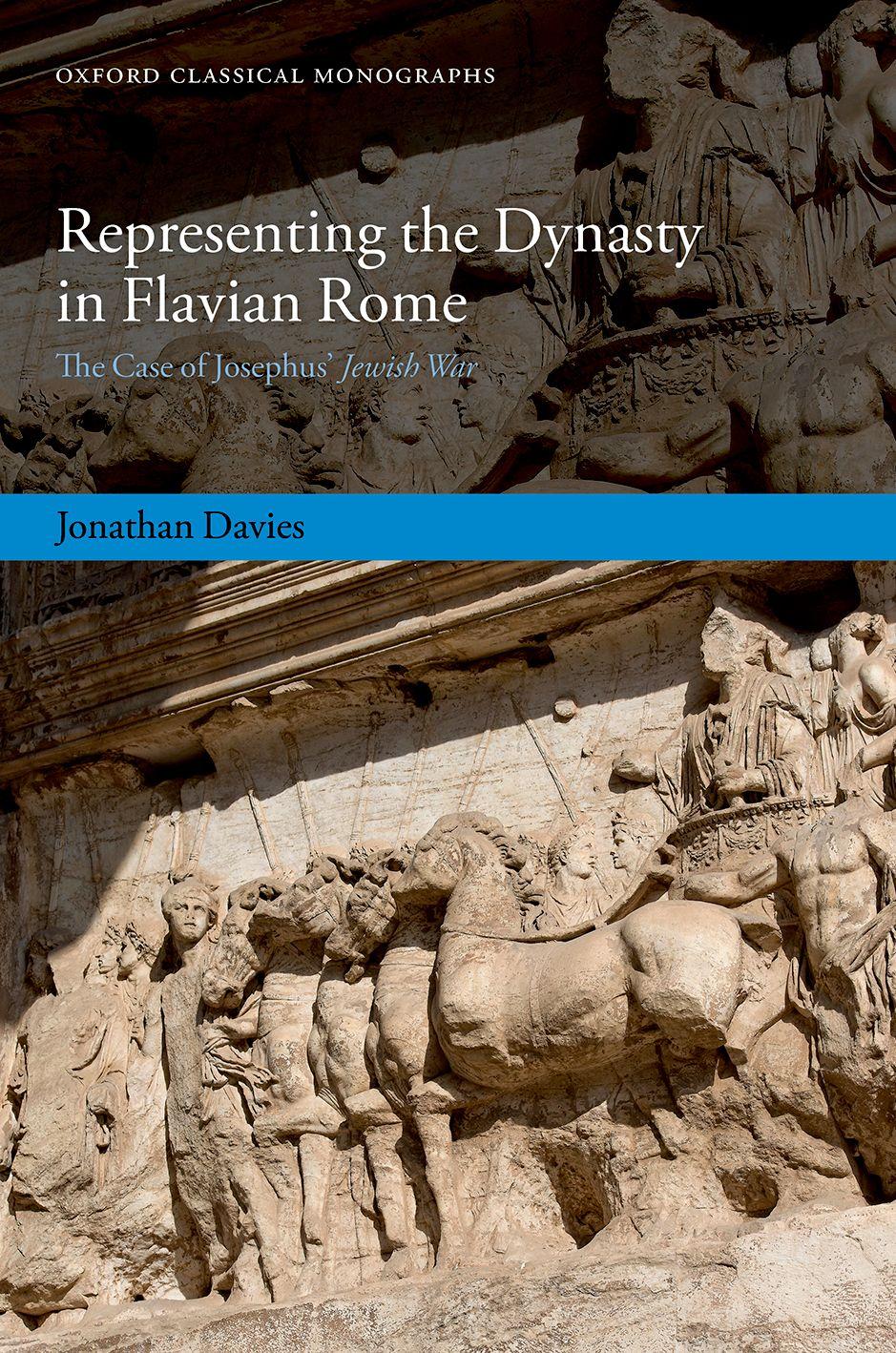Representing the Dynasty in Flavian Rome: The Case of Josephus' Jewish War (Oxford Classical Monographs) Dr Jonathan Davies Visit to download the full and correct content document: https://ebookmass.com/product/representing-the-dynasty-in-flavian-rome-the-case-ofjosephus-jewish-war-oxford-classical-monographs-dr-jonathan-davies/
More products digital (pdf, epub, mobi) instant download maybe you interests ...
Representing the Dynasty in Flavian Rome: The Case of Josephus' Jewish War Jonathan Davies
https://ebookmass.com/product/representing-the-dynasty-inflavian-rome-the-case-of-josephus-jewish-war-jonathan-davies/
Rome Resurgent: War and Empire in the Age of Justinian Peter Heather
https://ebookmass.com/product/rome-resurgent-war-and-empire-inthe-age-of-justinian-peter-heather/
Dissident Authorship in Mozambique: the Case of António Quadros (1933-1994) (Oxford Modern Languages and Literature Monographs) 1st Edition Stennett
https://ebookmass.com/product/dissident-authorship-in-mozambiquethe-case-of-antonio-quadros-1933-1994-oxford-modern-languagesand-literature-monographs-1st-edition-stennett/
Emperor Worship and Roman Religion (Oxford Classical Monographs)
https://ebookmass.com/product/emperor-worship-and-roman-religionoxford-classical-monographs/
Jewish Soldiers in Nazi Captivity: American and British Prisoners of War during the Second World War Linenberg
https://ebookmass.com/product/jewish-soldiers-in-nazi-captivityamerican-and-british-prisoners-of-war-during-the-second-worldwar-linenberg/
The Roman Empire in Crisis, 248-260: When the Gods Abandoned Rome Paul N. Pearson
https://ebookmass.com/product/the-roman-empire-incrisis-248-260-when-the-gods-abandoned-rome-paul-n-pearson/
Quantitative Techniques in Management 5th Edition Dr. N. D. Vohra
https://ebookmass.com/product/quantitative-techniques-inmanagement-5th-edition-dr-n-d-vohra/
A Supernatural War: Magic, Divination, And Faith During The First World War Owen Davies
https://ebookmass.com/product/a-supernatural-war-magicdivination-and-faith-during-the-first-world-war-owen-davies/
Borders and the Politics of Space in Late Medieval Italy: Milan, Venice, and their Territories (Oxford Historical Monographs) Dr Luca Zenobi
https://ebookmass.com/product/borders-and-the-politics-of-spacein-late-medieval-italy-milan-venice-and-their-territories-oxfordhistorical-monographs-dr-luca-zenobi/
OXFORDCLASSICALMONOGRAPHS PublishedunderthesupervisionofaCommitteeofthe FacultyofClassicsintheUniversityofOxford
TheaimoftheOxfordClassicalMonographsseries(whichreplacestheOxford ClassicalandPhilosophicalMonographs)istopublishbooksbasedonthebest thesesonGreekandLatinliterature,ancienthistory,andancientphilosophy examinedbytheFacultyBoardofClassics.
Representingthe DynastyinFlavianRome TheCaseofJosephus’ JewishWar JONATHANDAVIES GreatClarendonStreet,Oxford,OX26DP, UnitedKingdom
OxfordUniversityPressisadepartmentoftheUniversityofOxford. ItfurtherstheUniversity’sobjectiveofexcellenceinresearch,scholarship, andeducationbypublishingworldwide.Oxfordisaregisteredtrademarkof OxfordUniversityPressintheUKandincertainothercountries
©JonathanDavies2023
Themoralrightsoftheauthorhavebeenasserted Allrightsreserved.Nopartofthispublicationmaybereproduced,storedin aretrievalsystem,ortransmitted,inanyformorbyanymeans,withoutthe priorpermissioninwritingofOxfordUniversityPress,orasexpresslypermitted bylaw,bylicenceorundertermsagreedwiththeappropriatereprographics rightsorganization.Enquiriesconcerningreproductionoutsidethescopeofthe aboveshouldbesenttotheRightsDepartment,OxfordUniversityPress,atthe addressabove
Youmustnotcirculatethisworkinanyotherform andyoumustimposethissameconditiononanyacquirer
PublishedintheUnitedStatesofAmericabyOxfordUniversityPress 198MadisonAvenue,NewYork,NY10016,UnitedStatesofAmerica
BritishLibraryCataloguinginPublicationData Dataavailable
LibraryofCongressControlNumber:2023937490
ISBN978–0–19–888299–2
DOI:10.1093/oso/9780198882992.001.0001
Printedandboundby CPIGroup(UK)Ltd,Croydon,CR04YY
LinkstothirdpartywebsitesareprovidedbyOxfordingoodfaithand forinformationonly.Oxforddisclaimsanyresponsibilityforthematerials containedinanythirdpartywebsitereferencedinthiswork.
Acknowledgements Thisworkhasbenefitedfromtheinputofmanypeople,anditisagreatpleasureto acknowledgethosedebtshere.Myprimary academicdebtofgratitudeisowedtomy doctoralsupervisor,Prof.MartinGoodman,whoconsistentlyprovidedmewith rigorous,patient,generous,andinsightfulguidance,notonlyonthisworkbutalso ontheMPhilthesisfromwhichtheideaarose.IamalsoverygratefultomyAssessors forTransferandConfirmationofStatus,Prof.RhiannonAsh,Dr.AnnaClark,Prof. KatherineClarke,andDr.LukePitcher,whoseastuteinsightsandsuggestions radicallyimprovedsectionsofthiswork.Thefullversionofthethesiswasreadand commentedonbyDr.TessaRajakandProf.KatherineClarke(again),whose commentswereinvaluableintransformingtheworkfromathesisintoamonograph. GraduatestudentcolleaguesatOxfordinClassics,JewishStudies,andTheologyalso contributedtothethesisinavarietyofways,rangingfromprofferingtheirinsights duringcasualconversationstoreadingandcommentingondraftsectionsofthe work.IamespeciallygratefultoAndyStiles,OliviaThompson,ElizabethFoley, BradleyJordan,PanayiotisChristoforou,AitorBlancoPérez,JulianeZachhuber, UrsulaWestwood,J.E.Glas,DavidFriedman,AnthonyRabin,andJoshua Blachorsky,aswellastotheregularattendeesattheweeklyAncientHistoryWork inProgressSeminar,whohavescrutinizedmyideasmorethanonce.Iamgratefulto Prof.RhiannonAsh,GeorginaLeighton,KarenRaith,CharlotteLoveridge,andJamie Mortimerfortheirassistanceinthe finalstagesinadvanceofpublicationandtomy colleaguesatMaynoothUniversityforcreatingsuchacongenialprofessionalhome whileIworkedonthose finalstages.ThestaffattheSacklerLibrary,multipleother Bodleianreadingrooms,andtheWolfsonCollegelibraryinOxford,theFirestone LibraryinPrinceton,theBrothertonLibraryinLeeds,andthelibrariesofMaynooth UniversityandTrinityCollege,Dublin,alsoprovidedmuchneededsupportand assistancethroughout.Allerrorsanddeficienciesofthoughtremainmyown.
ThisworkcouldnothavebeenundertakenwithouttheextraordinarygenerosityoftheLittmanFoundation,whichcreatedascholarshipinmemoryofLouis LittmanandProf.GezaVermes;itisapleasuretorecordmygratitudehere. ThanksarealsoduetotheCravenCommitteeandWolfsonCollege,whichfunded ahighlyproductivetwo-weekresearchtriptoIsrael,andtotheLorneThyssen TravelFund(administeredbytheAncientWorldResearchClusteratWolfson), whichenabledmetoundertakeashortvisittoRometoexaminetheFlavian buildingprogramme.IalsothankLizBaird,Wolfson’sarchivist,forobtaininga copyofLevick(2000)forme.
IdedicatethisbooktomymotherGillandtothememoryofmyfatherBrian, withloveandgratitude.
TextsandAbbreviations ix
1.Introduction1
2.PoliticalExpressioninFlavianRome11
2.1PreliminaryObservationsonPublicationandCensorship11
2.2WritingPoliticsinFlavianRome15
2.2.1ConstrainingandPolicingPoliticalExpression15
2.2.2IdeologiesandStrategiesofVeridiction22
2.2.3ThePrinceandHisVirtues30
2.2.4TheProblemofContemporaryHistoriography35 2.3Conclusions48
3.The JewishWar:Audience,Structure,andDate50 3.1Audience50 3.2Structure52 3.3Date61 3.4Conclusions73
4.TheFlaviansin JewishWar 1–674
4.1Vespasianin JewishWar 1–674
4.1.1VespasianasaMilitaryCommander74
4.1.2VespasianandtheDivine84
4.1.3VespasianandtheLegitimacyoftheFlavianAccession98
4.1.4TheVirtuesofVespasian127
4.2Titusin JewishWar 1–6141
4.2.1TitusasaMilitaryCommander143
4.2.2TitusandtheDivine153
4.2.3TheVirtuesofTitus160
4.2.4TitusandtheDestructionoftheJerusalemTemple168
4.3Domitianin JewishWar 1–6182
5.TheFlaviansin JewishWar 7186
6.Conclusions205
6.1JosephusasLiar205
6.2JosephusasPanegyrist207
6.3JosephusasPropagandist208
6.4JosephusasDissident210
6.5JosephusasHistorian212
6.6JosephanFutures213
Bibliography 219 Index 241
TextsandAbbreviations WorksofJosephuswereconsultedintheLoebClassicalLibraryeditions.Thefollowing abbreviationsareused:
AJJewishAntiquities
BJJewishWar
C.ApAgainstApion
VLife
OtherclassicaltextswereconsultedinthelatesteditionoftheLoebClassicalLibrary,unless anothereditioniscitedinthebibliography.AllEnglishtranslationsofGreektextscitedin thisbookarebytheauthor.Abbreviationsarethoseusedbythe OxfordClassicalDictionary (4thedn),withthefollowingadditions:
Isoc. AdNic. Isocrates, ToNicocles Nic.Dam. Aug NicolausofDamascus, AgogeofAugustus OnasanderOnasander, TheGeneral Oros. Hist.adv.Pag. Orosius, HistoryagainstthePagans Philo, Quisheres? PhiloofAlexandria, WhoistheHeirofDivineThings?
Plut. Dion Plutarch, LifeofDion
Plut. Otho Plutarch, LifeofOtho
Plut. Quomodoadulator Plutarch, HowtoTellaFlattererfromaFriend Suet. Otho Suetonius, LifeofOtho
Sulp.Sev. Chron. SulpiciusSeverus, Chronicles Val.Flacc.ValeriusFlaccus, Argonautica
BooksoftheHebrewBiblewereconsultedintheMasoretictextasprintedinthe Biblia HebraicaStuttgartensia (5thedn,Stuttgart,1997).Abbreviationsusedarethoserecommendedin NewHart’sRules.
Abbreviationsforscholarlyjournalsfollowtheconventionsof L’AnnéePhilologique,with thefollowingadditions:
AJBIAnnualoftheJapaneseBiblicalInstitute EESEErfurtElectronicStudiesinEnglish H&THistoryandTheory
HirundoHirundo:TheMcGillJournalofClassicalStudies
JAJJournalofAncientJudaism
JESJournalofEuropeanStudies
JJSJournalofJewishStudies
JPolJournalofPolitics
JQRJewishQuarterlyReview
JSIJJewishStudies,anInternetJournal
Jur.Rev.JuridicalReview
MW-PMarburgerWinckelmann-Programm
PMLAPublicationsoftheModernLanguageAssociation
ROIRevuedel’OrganisationInternationalepourl’Étudedes LanguesAnciennesparOrdinateur Pol.Stud.PoliticalStudies
SBLSPSocietyofBiblicalLiteratureSeminarPapers
W&HWarandHistory
ZutotZutot:PerspectivesonJewishCulture
Otherabbreviationsareasfollows:
ANRWAufstiegundNiedergangderrömischenWelt
BMC 1H.MattinglyandE.A.Sydenham(rev.C.H.V.Sutherland), RomanImperialCoinsintheBritishMuseum,i(London, 1984)
BMC 2H.MattinglyandE.A.Sydenham(rev.I.A.Carradiceand T.V.Buttrey), RomanImperialCoinsintheBritishMuseum, ii.1(London,2007)
CILCorpusInscriptionumLatinarum
FGrHist. F.Jacoby, DieFragmentederGriechischenHistoriker, 7vols (Leiden,1940–58)
FRHist. T.J.Cornell(ed), TheFragmentsoftheRomanHistorians, 3vols(Oxford,2013)
ILS H.Dessau, InscriptionesLatinaeSelectae (Dublin,1974) McCrumandWoodheadM.McCrumandA.G.Woodhead, SelectDocumentsofthe PrincipatesoftheFlavianEmperors,IncludingtheYearof Revolution, 68–96 (Cambridge,1961)
PIR²ProsopographiaImperiiRomani (2ndedn)
RDGE R.K.Sherk, RomanDocumentsoftheGreekEast (Baltimore, MD,1969)
SIG W.Dittenberger, SyllogeInscriptionumGraecarum (Leipzig, 1915–24)
Introduction Thisbookconstitutesastudyofdynasticrepresentationinamajornarrative historyoftheearlyPrincipate,FlaviusJosephus’ JewishWar.Thegreatinterestof thisworkforRomanhistoriographersliesinitsstatusasouronlyextensiveextant examplefromtheearlyPrincipateofaoncecommontypeofliterature,contemporaryhistoriography,understoodheretomeananaccountofrecentevents whichprominentlyfeaturesindividualsstillinpowerfulpositionsatthetimeof composition.AsweshallseeinSection2.2.4(pp.40–1),suchhistoriesarederided insomeextantauthors;Josephus(thoughrarelyreadfromsuchaperspective today)allowsustogetbeyondthestricturesofancientcriticsofcontemporary historiographyandseehowacontemporaryhistoriannegotiatedpotentially difficultissuesconcerningbias,obligation,historiographical ‘truth’,andtheconstraintsthatdefinedtheboundariesofpermissiblediscourseabouttheimperial familyatRome.Thisstudywillattempttoexploretheseissues,consideringthe JewishWar initscontextofcomposition(RomeunderVespasianandpossibly Domitian),closelyexaminingthepicturesofVespasian,Titus,andDomitian whichemergefromthework,andattemptingtosituateJosephus’ dynastic representationswithinthebroaderlandscapeofdiscourseabouttheFlavian dynastswhichobtainedatRomeunderFlavianrule.
Inthisintroductorychapter,IwillsurveythepictureofJosephus’ relationship totheFlavianswhichhasevolvedinscholarshipsincethenineteenthcentury.The traditionalviewofJosephus’ relationshiptoFlavianpowerisscathingandcanbe wellillustratedbyaquotationfromoneoftheclassicstudiesofJosephus’ work:
Itwillbeevidentthathisisnotawhollyadmirable,stilllessanheroiccharacter, andthatasawriterhelackssomeoftheessentialqualificationsofthegreat historians.Egoist,self-interested,time-serverand flattererofhisRomanpatrons hemaybejustlycalled:suchdefectsareobvious.¹
Thisdevastatingassessmentofhischaracterandworksisfarfromunparalleledin olderscholarship.Josephus’ defectionincaptivityfollowingthesiegeofJotapata andhissubsequentwillingnesstovaunthiscloseconnectionswiththeFlavian emperorshaveseenhimreviledasanuntrustworthyquislingand,inafamiliar ¹Thackeray(1929)19.
phrase,a ‘Flavianpropagandist ’.²Broadlyspeaking,twotendenciesinnineteenthandearlytwentieth-centuryJosephusscholarshipunderpinthisunflatteringpicture.First,atendencytowardsmoralisticjudgementleadssomescholarstobase theirassessmentsofJosephus’ worthasanauthororhistorianontheirassessmentsofhisworthasahumanbeing,derivedlargelyfromunflatteringappraisals ofhiscareerandbehaviour,especiallyhisdefectiontotheRomansideduringthe earlystagesoftheJewishRevolt.Second,inkeepingwiththesource-critical approachwhichdominatedbothclassicalandbiblicalstudiesinthenineteenth century,weseeatendencytodiminishJosephus’ responsibilityforhisown writing,toviewhimasmoreofacompilerorcopyistthananauthor,and specificallytoclaimthatthe JewishWar iscloselybasedononeormorestrongly pro-Flavianlostprototypes,sothatthetextwhichwepossessslavishlyand uncriticallyreproducesFlaviandiscourse(whichisusuallyimagined,insuch scholarship,asunitary,static,andmonolithic).Thesetwotendenciesareoften inevidenceinthesamework,andindeedtheyaremutuallysupportive.Ifascholar determinesthatJosephuswasanuntrustworthy,dependent,servilecharacter,it seemstomakesensethathewouldslavishlyfollowthewordsofanapproved forebearwithoutregardforthetruth.Wewillbrieflysurveythesetendenciesbefore movingontolookathowthepictureofJosephushasevolvedsincethen.
Earlyevidenceofa ‘moralistic’ bentinJosephus’ scholarshipcanbefoundin thegeneralhistoriesofJudaismintheancientworldbyJost(1857)andGraetz (1888),whoseworkspourintemperatescornonJosephus’ characterand,consequently,hisreliabilityasahistorian.³ThequestforJosephus’ sourcesreallybegan withJustusvonDestinon’sstudyof JewishAntiquities 12–17and JewishWar 1, whichpostulatedthatthosebookswereverycloselybasedonalostanonymous sourcewhichprecededJosephusinretailingJewishhistorytoaHellenized audience.⁴ Thiswork’s(apparent)establishmentofthefactthatJosephus’ writing iscloselybasedonlostprecursordocumentsservedpartiallytovalidatesubsequentstudieswhichfocusedonJosephus’ historiographicalpracticesinthe Jewish War. GustavHölscher’sarticleonJosephusinPauly-Wissowadrawstogether boththemoralisticandthesource-basedcriticismsandappliesthemtoits discussionofthe JewishWar,presentingJosephusasacommissionedauthor eagertopleasehispowerfulpatronsandbasingmuchofthecontentofthe JewishWar onthe commentarii ofVespasianandTitus,whichJosephusclaims inhislaterworkstohaveconsultedwhenwritingthe JewishWar ⁵ Thenotionthat
²Onthelattercharge,see,e.g.,Bentwich(1914)27;Laqueur(1920)126–7;Bardon(1940)294–7; Shutt(1961)26;Schürer(1973)57;Yavetz(1975)421;Rhoads(1976)11–14;Alon(1977b);Bengtson (1979)275;Franchetd’Espèrey(1986)3065–7;Stern(1987);Schwartz(1990)2;Sterling(1991)238–40; Southern(1997)1;Levick(1999)3.
³Jost(1857)445–6;Graetz(1888)457–8. ⁴ VonDestinon(1882).
⁵ Moralizing:Hölscher(1916)1943; commentarii:Hölscher(1916)1951–94.Josephusonthe commentarii ofVespasianandTitus: V. 342,358; C.Ap. 1.56.
largelyplagiarizedcontentfromthe commentarii underliesatleastsomepartsof the JewishWar wouldbeinfluentialformuchofthetwentiethcentury;however, otherearlyscholars,awarethatthecontentofthe commentarii areunlikelyto havefullyencompassedallofthevariegatedsubjectmatterofthe JewishWar, suggestedadditionalRomansourcesfromwhichJosephusalsocopiedmaterial. AdolfSchlatteridentifiedalostsecondsourceasthehistoricalworkontheJews supposedlywrittenbyAntoniusJulianus,aloyalFlavianofficialandthegovernor ofJudaeaatthetimeofTitus’ siegeofJerusalem.⁶ Weberdoesnotattemptto identifybynametheauthorofJosephus’ supposedmainRomansourcebut presentsitsimplyasanowanonynmouspriorliteraryhistoryoftherevolt whichwasitselfcloselydependentonVespasian ’sandTitus’ commentarii. ⁷ Thus,Josephus’ evidentcharacter flawsarecompoundedbyhisslavishcopying ofoneormoreprecursorworks;identificationoftheseworksmayvaryfrom scholartoscholar,butwhattheyallhaveincommonisacloseadherencetothe FlavianlineandaclosealignmentwithFlavianinterests.Therefore,infollowing thesesourcetextscloselyanduncritically,Josephusisestablishedunquestionably asanapologistforthenewimperialdynasty.
Asthetwentiethcenturyprogressed,thisestablishedpictureofJosephus’ relationtoFlavianpowerbegantobreakdownandtomutateininteresting ways.Broadlyspeaking,thesource-criticalelementofthisconceptionof Josephuswasdispensedwith first,whilethemoralistictendencieslingeredon andareeveninevidenceintheworksofthosescholarswhowereinstrumentalin demolishingthenotionofahypotheticallostFlavianurtext(likeThackeray,as illustratedbythehighlymoralisticquotationwithwhichthischapterbegan).The groundworkwaslaidbytheimportantstudyofLaqueur(1920).Laqueuremphasizedtheneedtounderstand TheJewishWar asaunifiedcompositionwithits ownaims,tendencesandperspective.Howeveritmayhavebeencomposed,and whateveritsrelationshiptoitssources,the JewishWar isbeststudiedintheform inwhichwepresentlyunderstandit,alwaysbearinginmindthatJosephusretains ultimateresponsibilityforthe finishedproduct.Thus,Josephusbecomesan author,ratherthanalazyordishonestcopyist,andthenatureofthe Jewish War canbestbeunderstoodbyreadingitinthelightofwhatisknownof Josephus’ lifeandevolvingcareer.⁸ Thisis,ofcourse,methodologicallyproblematic(almostallthatweknowofJosephus’ lifederivesfromhisownworksandso
⁶ Schlatter(1923)98–101.ForthecareerofAntoniusJulianusinJudaea,see BJ 6.238.Julianus’ supposedliteraryworkonJewishhistorywillbediscussedinmoredetailinSection4.2.4(pp.170–2) below.
⁷ Weber(1921)43–67.On commentarii asaliteraryorparaliteraryform,seeRiggsby(2006) 133–56.
⁸ Laqueur(1920),esp.245–78.CzajkowskiandEckhardt(2021)isasuitablycautiousandnonjudgementalattempttoslightlywindtheclockbackonthisandpartiallyreconstructthelostworksof NicolausofDamascusfromtheextanttextofJosephus,recastinghimasacopyisttoagreaterextent thanmostmodernscholarshipwoulddare.
cannotbeconsideredas ‘context’ straightforwardlyindependentofthoseworks), and,moreover,someofLaqueur’sjudgementsarebasedlargelyonhisownrather idiosyncraticreconstructionofthelifeofJosephus.Furthermore,themoralistic tendencyisstillamplyinevidencehere,andthiscannothelpbutcoloursomeof Laqueur’sassessmentsofJosephus’ aimsandobjectivesinwriting.Nonetheless, theprocessofreattributingauthorialresponsibilityandagencytoJosephushad begun,atrendwhich(inquali fiedform)wouldalsocharacterizetheworksof Thackeray.Thackeray’smostfamouscontributiontoJosephanstudieswasthe introductionofthebrieflyinfluential ‘assistants’ theory,thatmuchofJosephus’ workinboththe JewishWar andthe JewishAntiquities wasinfactwrittenbytwo Greek-speakingassistants,oneheavilystylisticallyinfluencedbyThucydides,the otherbySophocles,whoeachwrotesectionsofthe finishedworkunderJosephus’ overallauthorityandsupervision.⁹ Thisisahalfwayhouse:onthismodel, Josephusissomethingmorethanamerecopyistandisresponsiblefortheoverall tenorandinterpretativeframeworkofhiswork,buthestilldoesnotdeservethe creditorblameforfullauthorship.The ‘assistants’ hypothesishasnowfallen decisivelyfromfavourinscholarship,seentobebasedoninsufficientevidence andtounderstatethedegreeofstylisticunitywithinJosephus’ writing.¹⁰ Thereal significanceofThackeray’sworkistwofold:itfurthersupportsLaqueur’sinsistenceonreadingthe JewishWar asanintegratedtextproducedbyasingleguiding intelligenceratherthanasanatomizedseriesofplagiarizedexcerptsfromlost Flavianoriginals;anditdiscernsandplacesattheheartofthe JewishWar not propagandisticpro-Flavianmessaging,butratheradvocacyandcounselforthe author’speople,withJosephusasanadviserwhocounselssubmissiontoRome notsomuchoutofcravencowardiceorregardforhisownfutureprospects,but becausehesawinthattheonlyvalidroutetothesalvationofJewsunderRoman rule.¹¹Nodoubtinfluencedbythesereadings,Lindner(1972)illustrateshowfar wehavecomebythelatetwentiethcentury.Professingultimateagnosticismon Josephus’ sources,Lindnerneverthelesstakesasaworkinghypothesisthenotion thatasingleRomansourceliesbehindmuchofthe JewishWar.Thismayseem likeabackwardstep,butLindnerfurtherarguesthat,ifthisisthecase,Josephus musthaverevisedandreworkedittoanextremelysignificantextent,andthatthe onlywayinwhichthe JewishWar canbeunderstoodisnotbyattemptingto reconstructitssources,butbyattemptingtoidentifyJosephus’ conceptionof history.¹²Thus,eveninanauthorwhoretainsa(qualified)adherencetothe
⁹ Thackeray(1929)100–24.
¹
⁰ ForanoverviewofscholarshipwhichunderminedandultimatelyoverthrewThackeray’smodel, seeBilde(1988)132–3.
¹¹Thackeray(1929)1–50.SeealsoBentwich(1914:52)andShutt(1961),thelatterofwhomgreatly downplaysthecontributionsoftheGreekassistantsincomparisonwithThackeray(18–40),forthese tendencies.
¹²SeeLindner(1972),esp.95–141,142–50,and(onJosephus’ guidingconceptionofhistory)21–48.
‘Romansource’ hypothesis,we findthatinpracticeitisJosephus,notthesource, whoshouldtakepriority.¹³ThecumulativeeffectofthistrioofcrucialtwentiethcenturyvoicesinJosephanscholarshipisthatJosephushasre-emergedasan author,notasamerecopyist,andthereforeweneedtorethinkanyconclusions abouthisrelationstoFlavianpowerthatmayhavearisenfrommistakenbeliefs abouthowhemayhaveusedalost ‘Flavian’ source.
Thus,bytheendofthetwentiethcentury,withinthespecialist fieldofJosephan studiesitwaswidelyrecognizedthattheold ‘Flavianlackey’ approachtothis authorwasinadequate.However,thisisnotauniversalpicture,andinplacesold prejudicesdiehard.ThusBeard(2003)urgesclassiciststoengagewithJosephus, butpreciselyonthegroundsthatheisapropagandistfortheFlavianline;asimilar perspectiveisfoundinMorgan(2006:270),Rappaport(2007:68),andAsh(2007: 29).Swoboda(2017a)depictsJosephusas ‘ a “defector” withaneyetohisown well-being’ andattemptstoarguethatthe JewishWar wasfundamentallyasortof CVinwhichJosephussetouttodepicthimselfasanidealmediatorbetween RomeandtheJews,withaneyetoappointmenttosomepoliticaloffice.Outside academiatoodiscussionsofJosephuscanstillberootedintheoldconception.The titleofSeward(2007), Jerusalem’sTraitor ,isafairreflectionofhowtheauthor conceptualizesJosephusandhisrelationtoRomanpower.TheAmericanconservativehumouristP.J.O’Rourke,inasomewhatunexpectedchapteronJosephus inhisbookonwar,dismissesourauthoras ‘slithering filth’,offeringamoralistic readingthatwouldhavefeltrightathomeinthenineteenthcentury.¹⁴ Despite theseaberrations(mostlycomingfromoutsidethespeci fic fieldofJosephus studies),themodernconsensusamongJosephusscholarsisclearlysomewhat different.However,whilemostJosephusscholarscanagreeonwhatJosephuswas not(aFlavianpropagandist),itdoesnotseemthatwehaveachievedanyformof consensusonwhatunderstandingofJosephus’ relationshiptoFlavianpower shouldreplacetheoldview.Thatisthedesideratumwhichthisbookaimsto address.
Whatwehaveseensinceroughlytheyear2000isagreatefflorescenceof scholarlywritingonJosephus,muchofwhichengages,directlyorobliquely,with theissueofJosephusandtheFlavians.Thegreatvolumeofpublishedscholarship precludesthepossibilityofanexhaustivesurveyhere(andsuchasurveymaynot beneeded,giventhatmuchofthismorerecentscholarshipwillbediscussed directlylaterinthisbook).WhatIwillattemptintherestofthischapterismore restrictedthanthat.IwillillustratewhatIbelievearethetwomaintrendsinrecent scholarshipwhichunderliethevarioustransformationsinhowweunderstand
¹³Bentwich(1914)isanothergoodexampleofthis ‘middlestage’,whereportionsofthetextare attributedtoJosephus’ Romansource(s)(44–5,53–67),whileoverallresponsibilityfortheworkandits (predominantlypro-Jewish,ratherthanpro-Flavian)tendencylieswithJosephushimself.
¹⁴ O’Rourke(1992)107–111;quotationfrom111.
Josephusandreadhimasapoliticalcommunicator,andofferexamplesofthose twotrends.Thesetwokeytrendsaretheincreasinglyfrequentapplicationof postcolonialtheorytoreadingsofJosephusandchangessincethemid-twentieth centuryinthewaythatclassicalscholarsunderstandtheroleoftheemperorand therelationoftheemperortoauthorsactiveinhisreign.
Postcolonialtheoryhaschangedtheapproachesthatscholarsinarangeof disciplinestaketowardscolonialidentitiesinwayswhichcandirectlyrelateto Josephus’ position.Forourpurposes,thekey findingofSaid’ s Orientalism isthat theOrient(itselfaWesterncategory)isneverallowedtospeakforitself:itexists solelytobestudied,catalogued,andexplainedbythelearnedmenofthedominantculture.¹⁵ Subsequenttheorists,influencedbySaid,paidmoreattentiontohow representativesofcolonizedpeoples can trytospeakinacolonialframework, oftenbyappropriatinganddeployingthelanguageofthehegemonicculturein ordertopresentthemselvesandtheirculturesinwayscomprehensibletotheir colonialmasters,butwhichnonethelesshavethepowertounsettle.Homi K.Bhabhahasbeenparticularlyinfluentialinthisarea,especiallywithhisconcept ofcolonialmimicy.MimicryistoBhabhainherentlysubversiveofcolonial thought,insofarasthe figureofthemimicmakesvisibletheintersticesbetween twomajorandinternallyincongruentaspectsofimperialideology,thecolonists’ desireforacivilizedandreformedOther(‘thecivilisingmission’),andthenotion oftheessentialand fixedracialinferiorityofthecolonizedtothecolonizer.¹⁶ Later theoristshavedevelopedBhabha’sideasbyconsideringthenotionofstrategic mimicry,theadoptionofmodesofdiscourseorofcategoriesandascriptionsfrom thecolonizingculturebythecolonizedasastrategyofdeliberateresistance.¹⁷ John Barclayhasbeenespeciallyinfluentialinbringingpostcolonialtheoryintothe fieldofJosephusstudies.Hisextensivecommentaryonthe AgainstApion begins withamethodologicaldiscussiononpostcolonialtheoryanditsapplicabilityto ourauthor,andthecommentarythroughoutappliessuchinsights,presenting JosephusasacraftyandcultivatedspokesmanforJudaism,exploitinghismastery ofbothJewishandGraeco-RomanculturetopresentaversionofJudaism agreeabletopotentialRomanreaders,whilealsosubtlyindicatingcritiquesof certainaspectsofbroaderimperialculturesuchasidolatry.¹⁸ Mader(2000) documentshowJosephusadopts,inthe JewishWar,aThucydideanframework of ‘scientifichistory’ inordertobolsterhispartisanobjectivesunderanillusionof impartiality,anillustrationofhowJosephus’‘doublemastery ’ allowshimto
¹⁵ Said(1978).¹⁶ Bhabha(1994)121–31.
¹
⁷ Importanttothistrend,indifferentways,areSpivak(1993),Schülting(1996),and(particularly usefully)Fuchs(2001:64–99),astudyofhowIncanhistorianswereabletoadopteliteSpanishnotions ofchivalryandusethemintheirSpanish-languagenarrativestocritiquetheSpanishoccupation ofPeru.
¹⁸ ForintroductorycommentsonpostcolonialtheoryandJosephusstudies,seeBarclay(2007)lxvi–lxxi.Barclay’scommentarygeneratedotherarticlesalsorelevanttotheapplicationofpostcolonial theorytoJosephus.SeeBarclay(2005)andBarclay(2008).
exploitGraeco-Romanexpectationsofthehistoriographicgenreinpursuitof advocacyfortheJews.SieversandLembi(2005)includesthreecontributions whichreadJosephusinpostcoloniallyinflectedways,thosebyBarclay,Mason, andSpilsbury.Barclay’sessay,focusedagainon AgainstApion,examineshow Josephusostentatiously ‘playsthegame’ ofGraeco-Romanhistoriography,ultimatelyinordertosubvertitstruthclaimsrelativetothehistoriesofNearEastern peoplesliketheJews;Masonarguesforapredominantlylocalintendedaudience inFlavianRome,whichencouragesustoreflectonhowthese(fromaRoman perspective)strangeworksofhistoriographymighthaveresonatedwithsuch readers;SpilsburylooksathowJosephus’ biblicalparaphrasessimultaneously reflectandunderminecommonRomannotionsofethics.Kaden(2011)examines JosephanmimicryandhybridityinhisaccountofAgrippaII’ s gentesdevictae speech(BJ 2.345–402),situatingthespeechinthecontextofliteraryimperial propagandabeforegoingontonotethatAgrippa’sreattributionofresponsibility fortheriseofRometotheGodofJerusalemsmugglesadistinctlyJewishversion ofdivineprovidenceintothepicture,complicatingthepropagandainawaythat onlypostcolonialinbetweennesscan.Ferda(2013)examinesJosephus’ channellingofJeremiah ’sTempleSermonatvariouspointsofhisworkinthe JewishWar, repackagingbiblicalhistoriographicalnotionsinGraeco-Romanformsinways whichwouldonlyhavebeenvisibletoJewishreaders.Rajak(2014)discussesthe productivealternationbetween ‘outsider’ and ‘insider’ perspectivesinJosephus’ writings,aphenomenonenabledbyhismasteryofbothJewishandGraecoRomanculture.¹⁹ My2019article,whichfocusesontheportentsofthedestruction oftheJerusalemTempleat BJ 6.293–9,arguesthatJosephus’ inbetweenessallows him,attimes,toadoptastrategyof ‘culturally-directeddoublespeak ’,constructing passageswhichwouldresonatedifferentlytoJewishandnon-Jewishreaders andpotentiallysendingoutdifferentmessagestoeachconstitutivereading community.²⁰ Inanarticlewrittenpartlyinresponsetothelastitem,EelcoGlas hasarguedforthenotionof ‘culturalbrokerage’ inJosephus’ worksandinvestigatedthewaysinwhichJosephusevokesandintensifiesemotionsinwaysfamiliar toGreekandRomanreadersinordertoinspiresympathyfortheJewishpeople amongpotentialGentilereaders.²¹Itshouldbeclearfromthissurveythatpostcolonialtheoryhashadasignificantandhighlyproductiveeffectonmodern readingsofJosephus,complicatingwhatwereonceseenassimpleandbinary questionsofloyaltyandallegiance.Thisphenomenonshouldhaveprofound consequencesforanydiscussionofJosephus’ engagementwiththeFlavians.
¹⁹ Seeespeciallythemethodologicalcommentsonpostcolonialtheory’srelevancetoJosephusin Rajak(2014)191–6.
²⁰ Davies(2019).
²¹Glas(2020).Otherexplicitdiscussionsofpostcolonialtheory’srelevancetothestudyofJosephus includeRajak(2014),esp.191–6,andBarclay(2007)lxvi–lxxi.
Inparallelwiththis,changesintheunderstandingoftherelationshipbetween emperorsandliteraturehavealsocontributedtothedevelopmentofourunderstandingofJosephus.SinceMillar’ s EmperorintheRomanWorld (1977),there hasbeenmoreofanawarenessofthereactivenatureofRomanimperialgovernmentandconsequentlylessofatendencytoseetheemperorcloselyinvolvedin everyaspectofRomansociety.Onesymptomofthishasbeenthatthenotionof poetsandotherauthorsasliterarypropagandistshasbeensomewhatinabeyance, eveninthecasesofauthorsknowntohavebeeninadirectrelationshipto membersoftheregime.Morerecentworkhastendedtostressauthorialindependence,withauthorsawareofthenecessityofnotupsettingtheemperorand consequentlyaimingtowriteworkswhichdidnotovertlydisrespecthim,but neverthelessretainingmuchindependenceandremainingresponsibleforthe contentoftheirownworks.²²Furthermore,startingwithFrederickAhl’ sessay onsafecriticisminGreeceandRome,anumberofclassicistshaveundertaken specificstudiesofpoliticalexpression,censorship,anddissidenceinRoman literature,andfoundpotentiallyunsettlingcontentinRomanauthorsoncealmost universallyconsideredaspropagandistic.²³SteveMasonhasbroughtsuchscholarshipintotheconversationaboutJosephus,principallyinanimportant2005 essaywhichexplicitlycitesAhlasitsmethodologicalinspiration.²⁴ Beginningby sketchingoutvariousGreekrhetoricalnotionsofironyandmisdirection,Mason proceedstoreadcloselyanextensivedossierofpassagesfromJosephus’ bodyof workwhichmaydemonstrateconcealeddissidenceinthemannerexpectedof Romanauthorsaccordingtotherhetoricalhandbooks.Mason ’sconclusionsare far-reaching:hearguesthat,farfrombeingFlavianpropaganda,the JewishWar actuallycontradictstheofficialFlavianlineonalmosteverypoint,depictingTitus asrecklessandundisciplinedandtransferringallthegloryforRome’ssuppression oftherevoltfromtheFlavianstotheJewishGod.²⁵ Ataroundthesametimeasthe publicationofthischapter,otherreadingsofJosephusalsoappearedwhich demonstratedincreasedsensitivitytopossibleveiledcritiqueordissidence. Thus,BarclayarguesthatJosephusadoptsaristocraticRomanvaluesinorderto usethemtocriticizeRome’sconductduringtherevolt,whileChapman’sworkhas focusedonhowJosephususesclassicalliterarymodelstotransformtheJewsfrom enemiesintotragicvictimsintheeyesofGreekandRomanreaders,in flat contradictionofthepitlilessFlaviannarrativeofthesuppressionoftherevolt.²⁶ Inanotherinfluentialarticle,MasonhasarguedthatJosephusevenpositions himselfwithininternalRomanconstitutionaldebates:hisexpresspreferencefor
²²ParticularlyimportantcontributionstothisdevelopmenthavebeenKennedy(1992)and Galinsky(1996),bothcontestingthenotionthatthemembersoftheMaecenascirclewereregime propagandists.
²³Ahl(1984a);Ahl(1984b);Rudich(1993);Bartsch(1994);Rudich(1997);SluiterandRosen (2004);Dominiketal.(2009a);Heilig(2015);BaltussenandDavis(2015a).
²⁴ Mason(2005a)²⁵ Mason(2005a)257–67.²⁶ Barclay(2005);Chapman(2005).
aristocraticovermonarchicalformsofgovernmentconstitutesacriticismofthe Principate,hisfocusonthedynasticstrugglesofHerodandhissubtleattemptsto linkthisthemetoAugustusdeliberatelyhighlightoneofthemosthazardous aspectsofRoman-styleautocracy,andhisdeploymentofthelanguageand argumentsofStoicisminthespeechofEleazarbenYaironMasadareflectsthe so-calledStoicopposition.²⁷ BartonandBoyarin(2016:178–99)bringShadi Bartsch’sconceptofdoublespeakintoplay,chartinghowJosephuscreatesstudied ambiguitythroughtheuseofcertainpolyvalentGreekwords(θρησκεία, δεινός, δεισιδαιμονία)tocreatepassageswhichcansimultaneouslyreflectaRomananda Jewishperspective,oftenwithstarklydifferentconnotationsandevaluative stances.Thissuddeninterestinthepossibilityof figuredcritiqueinJosephus, comingatpreciselythesamemomentaspostcolonialtheorywasbreakingdown oldbinaryunderstandingsofJosephusasatraitor,hasgreatlyenrichedthe possibilitiesforengagementwiththisauthor.Ahlandothersteachusthat,in therhetoricizedcultureofearlyimperialRome,eventhemost(ostensibly) obsequiousauthorscouldplausiblybesuspectedofgoingoffmessagefromtime totime,alessonwhichshouldnotbeignoredbythoseofusdevotedtothestudy ofthissupposedFlavianlackey.
Thisbriefsurveyisnecessarilypiecemealandselective,butnonethelesssufficienttoshowtheradicallychangedtenorofrecentJosephanscholarshipandthe centralimportancethatpostcolonialinsightsandevolvingunderstandingsof Romanpoliticalcommunicationhavehadoneffectingthistransformation.Far fromhimbeingamouthpieceoftheFlavians,moderntrendsinscholarshiphave enabledustoreconceptualizeJosephusasaproductoffertilecolonialinbetweenness,whosedoublemasteryofJewishandGraeco-Romancultureandcommand oftherhetoricaltechniquesprevalentincontemporaryRomanliteraturepotentiallyenabledhimtoremainaconsistentadvocateandspokesmanforIsrael,even whilelivingatthecourtofNebuchadnezzar.
Whatisstilllackinginthescholarship,however,isadetailedstudyofJosephus’ delineationofhisFlavianfriendsandpatrons.Thelastbook-lengthstudyofthis topic,Weber(1921),stillcontainsworthwhileinsights,butisvitiatedbyanow archaicconceptionofpoliticalexpressioninRomeandbythefactthatthe purposeofthebookseemslargelytobetoargueforanelaboratecomposition historyofthe JewishWar whichhasnoadherentstoday.²⁸ Thisstudyaimsto fill thatlacuna.Itishopedthatthe findingswillbeofvaluetoRomanhistorians
²⁷ Mason(2009a).Onthelastpoint,seealsoLadouceur(1987),esp.99–101.Mason’sviews, however,shouldbequalifiedbyarecognitionofthefactthatthelanguageoftheRepubliccontinued tobeemployedbytheearlyemperors,whichmeansthatJosephus’ expressedpreferenceforaristocratic ruleneednothavebeeninterpretedbyancientreadersasacritiqueofthePrincipate.
²⁸ Despiteitspromisingtitle,WilliamDenHollander’sbook Josephus,theEmperorsandtheCityof Rome (2014)haslittletosayaboutFlavianrepresentationinJosephus’ textsandismuchmore concernedwithconsideringwhatcanbesaidaboutthelifeandsocialpositionofJosephushimself atRome.
interestedinregimerepresentationundertheFlavians,tohistoriographerscurious aboutoursolesubstantialcontemporaryhistoryfromtheearlyPrincipate,to JosephusscholarsinhelpingtosituateJosephusinhisimmediatepoliticalcontext ofcomposition,andtohistoriansoftheJewishRevolt,whoneedtoconsiderthe extentandnatureofJosephus’ obligationstotheFlavians.
Chapter2surveyspoliticalexpressioninFlavianRome.Itconsidersliterary ideologiesofveridiction,especiallyinrelationtothehistoriographicalgenre,as wellaswaysinwhichthelimitsofacceptablediscoursewereconceptualizedand policed,andhowthoselimitscouldbechallenged.Chapter3addressesimportant andrelatedquestionsofintendedaudience,date,andstructureinthe JewishWar, particularlythelong-debatedquestionofthedateoftheseventhbookofthat work.ItconcludesthatthereisareasonablelikelihoodthatBook7wasaddedin thereignofDomitiantoanalreadycompletedworkcomprisingBooks1–6; therefore,Josephus’ Flavianrepresentationsinthatbookneedtobetreated separatelyfromtherestbecauseofthedifferentpoliticalconditionswhich obtainedunderDomitian.Chapter4examinesJosephus’ portraitsofthe FlaviansinBooks1–6,indialoguewithwaysinwhichthese figureswererepresentedinFlavianRome;Chapter5considershowtheFlaviansarerepresentedin theseventhbookandaimstostayalerttopossibleresonanceswithregime representationinDomitian’sRome.The finalchapter,Chapter6,providesaseries ofoverallconclusionsandsuggestssomepossibledirectionsforfutureresearch.
PoliticalExpressioninFlavianRome Thepurposeofthischapteristoestablishatheoreticalandmethodological frameworkforananalysisofpoliticalexpressionandregimerepresentationin the JewishWar,aframeworkwhichbothtakesintoaccountmodernthinking aboutissuesofpoliticalexpressionanddevelopsanapproachtothesequestions rooted firmlyinJosephus’ historicalcontext.Ibeginwithaconsiderationof relevantaspectsofmoderntheoreticalworkonpoliticalexpression;subsequent sectionswillsurveytheconstraintsoperativeonauthorsundertheearlyemperors (Section2.2.1),examinethecountervailingliteraryideologiesofthetimewhich correspondinvariouswaystomodernnotionsoffreespeech(Section2.2.2), considerthewaysinwhichancientauthorsrepresentandevaluatethecharacters ofrulers(Section2.2.3),andaddressthespecificaspectsofthegenreofcontemporaryhistoriographywhichpertaintotheseissues(Section2.2.4).Asthegoalsof thischapteraremethodologicalandcontextual,the JewishWar willnotbe discussedindetailatthisstage,andreferencestothatworkwillbeinfrequent andmadeinpassing.MaterialfromtheotherworksofJosephuswillbetreated hereinmoredetail,whereappropriate.
2.1PreliminaryObservationsonPublicationandCensorship InconsideringJosephus’ placeinthelandscapeofpoliticalexpressionunderthe Flavianemperors,weareengagingwiththemesalreadyprominentinantiquity. Theperceivedlossoffreedomopenlytoexpressone’sviewsonpoliticalaffairs whichaccompaniedthetransformationofRome’spoliticalsystemunderthe Principateisoneofthegreatthemesofearlyimperialliterature,andthecontrast (impliedorexplicit)isalmostinvariablywiththeperiodofthe ‘free’ Republic.¹ WhilesomeauthorsgrantthattheemergenceofthePrincipatebroughtgreater stability,itcameataprice:thestiflingofexpression,andthecreationofaculture wheretheonlyliteraryartwhichcouldtruly flourishwasthedebasedrhetoricof thepanegyristsandthe delatores.²Whenreadingsuchverdicts,itisalmost irresistiblytemptingtoreachforsinisterparallelsfromthemodernworldto
¹e.g.Tac. Hist.1.1–1.2; Ann. 1.72;4.34–5; Agric. 1.1–2;Plin. Pan.57. ²e.g.Tac. Dial. 11–13,36–41;Plin. Pan. 54,76.SeeO’Gorman(2020)31–80.
RepresentingtheDynastyinFlavianRome:TheCaseofJosephus’ JewishWar.JonathanDavies,OxfordUniversityPress. ©JonathanDavies2023.DOI:10.1093/oso/9780198882992.003.0002
morerecentandfamiliarsocietieswhichfeltthemaligncensorialeffectsofthe impositionofautocracy.³
However,suchparallelsshouldberesisted.Modernnotionsofbothfreespeech andcensorshipareanachronistictotheRomanworld,developedastheywereafter theadventofmechanizedprinting.⁴ Theprintingpressbroughtagenuinelyfundamentalchangeinthehistoryofcensorship.Representingtorulingauthorities bothathreat(becauseofthemassivelyexpandedreachofpublishedmaterial)and anopportunity(becauseofthecreationofabottleneckintextcirculationwhich mightplausiblybemonitoredandcontrolledbythestate),mechanizedprinting introducedthemoderncensorshipregime,withitsbureaucratizedapparatusandits obsessivefocusontheprepublicationlicensingofappropriateliterature.⁵ Such systemsareprimarilypreventiveratherthanpunitive,andwithinthemthepunishmentofauthorsandthedestructionofworksonlybecomenecessarywhenthe censorshipsystemfails,whenillicitlyprintedorimportedliteraturecircumventsthe safetynetofthecensorshipbureau.⁶ Conversely,inantiquity,nothinglikethiswas known,andgiventhedifficultyofcontrollingandpolicingmanuscriptcirculation asitwaspractisedatRome,suchsystemscouldneverhavedeveloped.⁷ John Milton,oftenseenastheoriginatorofmodernthinkingaboutfreespeechinhis Areopagitica (1644),alwaysshowsaclearawarenessofthefactthattheregulationof literatureinantiquityworkedfundamentallydifferentlyfrominhisowntimes.⁸
Ifwewishtoavoidanachronism,ourapproachtoliteraryregulationinimperial Romemustthenproceedfromaconsiderationofthewaysinwhichliterature circulatedinthatsociety.Muchhasbeenwrittenonthenatureofpublicationin theearlyEmpire,andwhilethereissomedisagreementonspecificdetails,the basicpatternisasubjectofbroadconsensus.⁹ Unpublishedtextswouldbeshared
³Cramer(1946)isfullofthelanguageofmoderntotalitarianism.SeealsoToynbee(1944)43, Quinn(1982)128,andtheastonishingverdictofR.M.Ogilvie(1980:184)that ‘literatureunderthe EarlyPrincipatewasinanexactlyanalogousplighttoliteratureinthemodernSovietUnion’
⁴ Peters(2005:14–32)summarizestheliberaltraditionoffreespeechphilosophyandjurisprudence fromitsoriginsshortlyafterthespreadoftheprintingpress.
⁵ Byfarthemostdetailedandusefulaccountofthelegislativehistorybehindthefoundationalearly modernsystemisSiebert(1952).SeealsoThomas(1969)1–33;Hill(1985b).Ontheimportanceof printingtothehistoryofcensorship,seeCoetzee(1999)9,41–2.
⁶ Forpreventiveandpunitivecensorship,seeBlyum(2003)1–2.
⁷ Itisinterestingtonotethatsomeauthorsofhighsocialstatusintheearlymodernperioddisdained thepressandpreferredtocirculatetheirwritinginmanuscriptform,andthatthisalternativesystemof literarycirculationpersistedrightthroughthesixteenthandseventeenthcenturiesentirelyunmolested bythegovernmentcensorshipapparatus,eitherbecausetherewasnoperceivedneedtocontroltexts whosenumberswouldbecomparativelystrictlylimitedorbecausethereissimplynoeffectivewayto policetheproductionofhandwrittenmanuscripts.Onthis,seeHill(1985b)33.
⁸ Milton(2013),183.OnMiltonastheoriginatoroffreespeechtheory,seeSiebert(1952)3,196–7; Saillens(1964)125.Thisisaliteraryoriginsmyth,andassuchshouldbetreatedwithcaution.Hill (1977:150)listsmanyobscureradicaltreatisesofthesixteenthandearlyseventeenthcenturieswhich anticipateMilton’sarguments.
⁹ Ogilvie(1980)12–14;Quinn(1982)88–92,169–71;Starr(1987);Harris(1989)224–5;Dupont (1999)223–37;Potter(1999)29–36;Nauta(2002)92–124;Mason(2005b);HuitinkandVanHenten (2006);Mason(2011b).
bytheauthorwiththeirfriends,acquaintances,andliterarypatronsintheformof privatereadingsorwrittendraftsforcomment,allontheimplicitunderstanding thatthesetextswouldnotbesharedfurtheruntiltheauthordecidedtheworkwas ready.¹⁰ Eventually,authorswouldrelinquishcontroloftheirtexts,beginningby sendinggiftcopiesofthepolishedworktofriendsandpatrons(whowouldbe expectedtoencouragefurthercirculation),andperhapsbydepositingsome manuscriptswithbooksellerstomakecopiesfortheircustomers.¹¹Ifanymoment inthisprocessoughttobecalled ‘publication ’,itisthis finalrelinquishingof control,whichwasdesignatedbyarangeofterms, ἐκδιδόναι and δημοσιοῦσθαι in Greek, edidere, emittere,and publicare inLatin.¹²However,evenatthisstagewe oughtnotimaginebookproductiononascaleatallcomparablewiththatof printing:inawell-knowncasestudy,PlinytheYoungerdescribeshowAemilius Reguluscirculatedonethousandcopiesofamemoirofhisdeceasedson’slife,and Pliny’stonesuggeststhatthisrathermodestscaleofproductionwas,bycontemporarystandards,wildlyextravagant.¹³Nothingcomparablewiththescaleof manuscriptdistributionenabledbytheprintingpressexisted,whichgreatly limitedthedamagethatwrittencriticismcoulddotothereputationsofthosein power.Furthermore,consideringtheprivatenatureofmanuscriptcopyinginthe ancientworld,thelackofauthorialcontroloverwhocouldmakecopies,andthe absenceofanycentresofmanuscriptmassproduction,itishardtoimaginehow theRomanemperorsortheiragentscouldhavecontrolledorscreenedthe productionofliterarytextsinthewaythattherulersofearlymodernEngland could,evenifitoccurredtoanyofthemthatthiswouldbedesirable.
Itwouldseemfromthesepreliminaryremarksthattheprofounddifferences betweenpublicationandcensorshipancientandmodernmakeitimpossibleto applyanyofourclassicmodernmodelsofcensorshipwholesaletothesituationin RomeundertheearlyPrincipate.However,anapproachtothestudyofcensorshiphasemergedwhichismorepromisingforourpurposes,notleastbecauseit enablesthemeaningfuldiscussionofcensorshipinsocietieswhich,likeRome,had noofficialcensorshipapparatus.Thisapproach,whichHelenFreshwatercallsthe ‘NewCensorship’,hasitsrootsintheoreticalmodelsdevelopedbyFoucault.¹⁴
ForFoucault,power-knowledgehasintrinsicallycensoriousqualities:oneof thekeytechniquesofFoucauldiandisciplinarypowerisnormativejudgement, whichnecessarilycreatesdomainsofunacceptability.¹⁵ However,thegeneration ofpower-knowledgeisnotrepressive,butratherconstitutiveandproductive.
¹⁰ Quinn(1982)88–90,170;Starr(1987)213.Harris(1989)225.
¹¹Quinn(1982)90–2;Starr(1987)214–15;Potter(1999)29;Nauta(2002)121–2.Forbooksellers, seeStarr(1990).
¹²HuitinkandVanHenten(2006)51–3.
¹³Plin. Ep. 4.7;Harris(1989)224;Potter(1999)32.OnRegulus,seeAsh(2013).
¹⁴ Freshwater(2004).Thisarticleisamorecomprehensivesurveyof ‘NewCensorship’ scholarship thancanbeessayedhere:anothersurveyisprovidedbyMüller(2004b).
¹⁵ Foucault(1991)177–84.
Powerbothdefinesandproducesknowledgeabouttheareasdeclaredtaboo,not only(inthemodern ‘carceralarchipelago’)specificandadministrativeknowledge, butalsocategoriesandtheoreticalmodelstoexplain(andsafelydiscuss)the deviantandthetaboo.¹⁶ Onceanauthoritativediscoursehasbecomeestablished and fixeditslimits,itcanbeextremelydifficultforthemodernsubjecttorede fine orstepoutsidethisdiscourse.Evenartorliteraturewhichis ‘transgressive’ is,inits ownawarenessofthelimit,complicitinthe fixingofthatlimit.¹⁷ Theultimate telos ofFoucauldiansystemsofdominationisthesameasthe telos ofBentham’ s Panopticon,thatthesubject,consciousof(thepossibilityof)constantsurveillance,examination,andnormativejudgement,internalizesthedominantdiscourse,thusbecomingcomplicitintheirownsubjection;undersuchasystem perfectlyformed,overtcensorshipshouldnotbenecessaryatall.¹⁸ However,the authoritativediscourseitselfsuppliesthemeansforitsownresistance.Marginalized peopledonotcreatetheirowncounter-discourses exnihilo somuchasdeploythe termsofthemarginalizingdiscoursetosuittheirownends.¹⁹ Therequirementof themarginalizedtoadoptandadaptthenearinescapabledominantdiscourseisan insightofsomerelevancetopostcolonialtheory,whoseapplicabilitytotheworksof JosephushasalreadybeennotedinChapter1.²⁰
Thelogicalconclusionofallthisisthatcensorship,inanysociety,isinescapable,butthisisnotthewholestory.Anactofcensorshipalwaysembodiesand containsthecensoredmessage,andsodoesacensoredwork,initsinterlinear whispersanditseloquentsilences.²¹Oneofthewaysinwhichcensorshipis productiveisthatitencouragesliterarystrategiesofpolysemy,anaspectof censorshipparticularlystudiedbyAnnabelPattersonin Censorshipand Interpretation,awide-rangingreadingofsixteenth-andseventeenth-century Englishliterature.Patterson’sanalysisof ‘thehermeneuticsofcensorship’ focuses onhowcensorshipdoesnotimposesilenceonliteraryexpressionsomuchas generateanetiquetteabouthowdifficultsubjectmatteroughtandoughtnottobe discussed,andassuchitstimulatesevasion,ambiguity,andallusion.²²Insuch aculturalclimatetherelationshipbetweencensorsandcensoredbecomes notoppositionalbutcollaborative,withcensorsassumingtheroleofeditorsor co-authors,thegoalbeingthecreationofanacceptabletext.²³Centraltothisisthe constructionofasortofplausibledeniability,ensuringthattextsarenot selfevidently subversive.²⁴ Thiscomplicityextendsbeyondthecensor –authordyad, however,outintothereadingpublic.Theconsumersofliteratureincensoring
¹⁶ Carceralarchipelago:Foucault(1991)298.¹⁷ Foucault(1977b)34–5.
¹⁸ Bourdieu(1991)138.¹⁹ Foucault(1998)101.²⁰ SeeChapter1,pp.6–7above.
²¹Jansen(1991)193–4;Butler(1998)250;Freshwater(2004)232.
²²Patterson(1984).SeealsoLoseff(1984).
²³Harrison(1995:18)observesthatmanyFrenchcensorsofthe AncienRégime werethemselves literarymenand philosophes,whosenotesshowthattheyapproachedtheircensorialdutiesmuchas literaryeditorsorcritics.
²⁴ Burt(1998)21–5.
societiesbecomeaccustomedtoreadingbetweenthelines,expertatpickingupon mutedsignalsfromthetext.²⁵ Butthesuspicionofsophisticatedreaderscarriesits owndangers,aswitnessedbythecomplaintsofanumberofclassicalauthors abouttheincorrectinterpretationofsomeoftheirworks(itselfacensorious strategy).Theconnectionbetweenthisandcensorshipisparticularlyclearin Martial7.34,whereMartialobservesthathis ‘harmless’ question quidthermis meliusNeronianis? (‘whatcouldbebetterthanNero’sbaths?’)mightbetakenby some malignus toimplyapreferenceforNerooverDomitian.Justascensors cannotpinasinglemeaningonamultivalenttext,soauthorscannotcontrolwhat readerswillseethere.Readerscanbecomplicitwithcensorsaseasilyaswith authors,andthisisnodoubtanothersourceofanxietyinasocietywhereliterary receptioncanbeamatteroflifeanddeath.
TheFoucauldianmodelofferscertainadvantagesforthisproject.Itallowsusto retaintheterm ‘censorship’ withoutneedingtoimaginetheexistenceofaFlavian MinistryofTruth;itoffersawayofthinkingabouttheroleplayedbyauthorsin thenetworksofpowerrelationsintheirdayandofseeingmoreclearlythekindsof pressuresunderwhichtheywroteandwhichtheytriedtoexertontheirsocieties; itconnectsusefullywithpostcolonialmodelswhichareparticularlyvaluablefor thestudyofJosephus;anditcanbothexplainandrefineourappreciationof knownandrecognizablephenomenainRomanliterature.Itismyaiminwhat followstoofferaFoucault-inflectedreadingofthedynamicsofpower-knowledge inRomeasseenthroughthelensofliteraryexpressionandconstraint,areading whichisattentivetotheproductiveandconstitutivenatureofthelimitsenforced bycensorship,totheappropriationandreuseofthedominantdiscourseby authorsinthatcontext,andtothestrategiesofindirectionthatwemaydetect inthetexts.
2.2WritingPoliticsinFlavianRome 2.2.1ConstrainingandPolicingPoliticalExpression
ThemethodsavailabletothepowerfulintheearlyRomanEmpiretodeter, suppress,orpunishinappropriatepoliticalexpressionhavebeenextensively studiedinpriorliterature,andafulldiscussionisnotnecessaryhere.²⁶ Whatis requiredinordertosetJosephusinhiscontextisabriefsurveyofthesemethods, withaparticularfocusontypesofcensorshipattestedintheFlavianperiod,
²⁵ Holquist(1994)14;Freshwater(2004)234.
²
⁶ ImportantcontributionsonaspectsofimperialcensorshipincludeDürr(1880);Greenidge (1895);Forbes(1936);Cramer(1946);Smith(1951);Chilton(1953);Rogers(1959);Allisonand Cloud(1962);Bauman(1970);Bauman(1974);Levick(1979);Ferrary(1983);McHugh(2004); Moles(1998);Rutledge(2001);Rutledge(2009);Stiles(2013);Howley(2017).
togetherwithconsiderationoftheeffectthesemeasuresarelikelytohavehadon authorsattemptingtoengagewithcontemporarypoliticalissues.Thesurvey whichfollowswillconsiderinstancesofthecensorshipoforalaswellaswritten politicalexpression,becauseitisbynomeansclearthatforlegalpurposesareal distinctionwasdrawninantiquitybetweenthesecategories.WhileFlavian instanceswillbeprioritizedinthisdiscussion,occasionalreferencewillbemade totechniquesofdiscourseregulationattestedundertheJulio-Claudiansbutnot theFlavians;whatissignificantforourdiscussionisnotwhetherornotthe Flaviansactuallydidpractiseanygiventechniqueofcensorship,buttherange ofpossibletechniqueswhichwereavailablebytheFlavianperiod.
InSection2.1,attentionwasdrawntothedistinctionbetweenpreventive andpunitivecensorship,andtothefactthatcensorshipinmoderncensoring societiestendstobeprimarilypreventiveinnature,whileinantiquitypunitive censorshippredominatedbecauseoftheimpossibilityofcontrollingmanuscript production.²⁷ Afewanecdotesinthesourcesrevealevidenceofsomeformsof preventivecensorshipinantiquity,butthatpreventivecensorshipwasnotthe preserveofthecourtsoracensorshipbureaubutwasexertedinmoreinformal waysandrelatedrathertothenatureofpatronage,publication,andliterary culture.Authorswhowerepersonallyknowntotheemperors,whetherthe recipientsofimperialpatronageornot,mightexpecttheirworkstobeofpersonal interesttothe princeps orthosearoundhim.Wehaveafewanecdotes(thoughnot many,andnonefromtheFlavianperiod)illustratingemperorspersonally requestingtheinclusionorremovalofparticularmaterialintheworksofauthors knowntothem.²⁸ However,evenintheabsenceofdirectimperialinterventionsin thecontentofauthors’ works,theimportanceanddesirabilityofimperialpatronage(attestedfrequentlyenoughinthepoetryofMartialunderDomitian)would actasaspurtotheproductionofworkswhichare,atleastostensibly,highly appreciativeofthe princeps.²⁹ IntheFlavianperiod,wemightnotetheestablishmentbyVespasianofchairsofGreekandLatinrhetoricatRome,amovewhich couldbeinterpretedeitherasdisinterestedpatronageoftheartsorasanattempt tocreateprestigiousandinfluentialrhetoricalexpertsatRomewhoseoutput waslikelytohaveanimperialpanegyricalslant(andregardlessoftheintention
²⁷ SeeChapter1,pp.12–13above.
²⁸ Serv. ad.Ecl. 10.init, adGeorg. 4.1mentionsAugustus’ requesttoVirgiltoremoveapanegyricof thedisgracedCorneliusGallusfromtheendoftheFourthEclogue(onwhich,seeAnderson1933; Duckworth1959;Otis1963:412–13;Pagán2004;onGallus,seeBoucher1966).Suetonius’ Lifeof Horace mentionsthatAugustuscomplainedtoHoracethathedidnotfeaturesufficientlyprominently inthe Sermones,whichledtothepanegyricalcommentsat Epist. 2.1.1–4.NotealsoLivy4.20.5–7, whereLivyreportshisinclusionofanantiquariantestimonyaboutthe spoliaopima fromAugustus, whichcontradictedallpreviousreports(onthis,seeHarrison1989;Rich1999;Flower2000; McPherson2010).J.Griffin(1985:190–1)commentsontheirresistibleforceofsuchrequestsfrom the princeps ²⁹ ForimperialpatronageinMartial,see,e.g.,1.4;4.27;8.24;8.56.
behindthemove,thisislikelytohavebeenitsoutcome).³⁰ Similarly,Domitian’ s establishmentoftwopoeticcontests,theCapitolineandAlbanGames,hasbeen seenbysomeashelpingtofosteracultureofpanegyricpoetry:allthatweknow aboutthewinnersofthesecontestssuggeststhattheirworkstradedinthepraiseof the princeps’saccomplishments.³¹Ofcourse,itistruethattheemperorwasnever thesoleliterarypatronavailableintheFlavianperiod,buttheevidentdesirability ofimperialfavourislikelytodictate,tosomeextent,thenatureandtoneofthe workproducedbymanycontemporaryauthorsandtorendercertaintypesof politicalexpressionlesslikelytobearticulated.³²Thesemi-publicnatureofthe draftingprocessatRome,incorporatingtheprevalentcultureofthe recitatio, meansthatthehabitofemperorsandotherpowerfulpeopleofattending recitationes couldfurtherexertachillingeffectandofferopportunitiesforthepowerful tovoicetoauthorstheirdissatisfactionwithcertainaspectsofliteraryproductions aheadof finalpublication.³³Themechanicsofthisareperhapsinevidencein Tacitus’ Dialogus,setinthereignofVespasian:Maternus’ recitatio hasupsetsome potentes,andhisvisitorsadvisehimtoremovetheoffendingpassagesfromhis playaheadof finalpublication(althoughherefuses).³⁴ InthecaseofJosephus, whonotonlysentthe finishedproductofhislabourstotheemperorsbut apparentlysentdraftstoVespasian,Titus,andAgrippaII,theexpectationofan imperialaudiencewouldneedtoberegardedasavirtualcertainty,afactwhich wouldpresumablyhaveneverbeenfarfromhismindwhenconstructinghis Flavianportraitsinthe JewishWar.³⁵
Wenowmovefrominformalstrategiesofpreventivediscourseregulationto moreformalpunitivestrategies.ThereoperatedallthroughthePrincipatethe Romancivillawof iniuria,onemeansthroughwhichpeoplecouldseekredressif theybelievedtheyhadbeendefamed.³⁶ Althoughoursourcesaresilentonthe employmentofthe lexdeiniuriis incasesofdefamationundertheearlyEmpire, itisperfectlypossiblethatsuchproceduresweretakingplaceoutsidetheimperial
³⁰ Suet. Vesp. 18;Dio65.12.1a.Franchetd’Espèrey(1986)3052–3.
³¹Bardon(1940)327–9;Coleman(1986)3095–109.
³²Onthenon-imperialpatronagesceneinFlavianRome,seeNauta(2002).
³³On recitationes andpublishing,seethediscussioninSection2.1(pp.12–13)above,with referencesthere.ForAugustusattending recitationes,seeSuet. Aug. 89.3;forClaudius,seePlin. Ep.1.13.3.
³⁴ Tac. Dial. 2–3.Onthis,seeGallia(2009).
³⁵ V.361–7.Foranearlieriterationoftheheavyinvolvementofthepowerfulindirectinganauthor’ s drafts,seeCicero’sstruggleswiththeletterofadvicetoCaesarwhichhehopedtopublish(Cic. Att. 12.40.2;13.27.1;13.28.2;withHall2009:100–3).
³⁶ Latejuristicsourcesdiscussthislegislationascurrent,whichsuggeststhatitcontinuedtooperate. Bauman(1974:36–7)collectsthereferencesfromthejurists.Romandefamationlawappearstohaveits originsintheTwelveTables,inapieceoflegislationquotedbybothCiceroandtheelderPliny(Cic. Tusc.4.4,ap.Aug. Deciv D.2.9;Pliny HN 28.19).Onthislaw,seeSmith(1951)andRives(2002).This lawapparentlymandateddeathasthepenaltyfordefamation:bythemiddleRepublic,however,ithad beensubsumedundertheoffencessusceptibletoa iurisactio,acivilsuitfordamages.Thepenalty remained financial,thoughconvictionalsoincurred infamia (Garnsey1970:185).
circleandthatthen,asnow,thepossibilityofhavingtopaydamagesforincautious invectivemayhaveactedasasignificantincentivetowardsliteraryself-censorship.³⁷
Morenotoriousbyfarwasthe crimenmaiestatis.Thislaw,originallyameasure introducedbytheradicaltribuneAppuleiusSaturninustopunishsenatorial incompetenceandabuseofoffice,hadfromthereignofAugustuscometobea potentweaponagainstthedefamationofthepowerful.³⁸ Itisimportanttonote, however,thatinseveralrespectsthiswasnotinanystraightforwardwayatool wieldedbytheregimetosuppresscriticismofthe princeps. Inthe firstplace,the legislationhadabroaderremitthanthat,encompassingthedefamationofanybodyprominent(probablymembersofthesenatorialclass).³⁹ Moreover,unlikea iurisactio for iniuria,whichcouldonlybebroughtbytheinjuredpartyortheir guardian,achargeof maiestas couldbebroughtbyanybodyforwhatthey perceivedas(orcouldpresentas)defamationofthepowerful.⁴⁰ Oncetheprecedentbecamesecurethatpeoplecouldbetriedunderthislawfordefamingthe princeps orthoseclosetohim,apotentiallydangeroussituationdeveloped.Inthe Republic,one’sdignitywasone’sownconcern,andaffrontstothatdignitywere settledeitherextrajudiciallyorinprivatelaw;underthePrincipate,responsibility fortheprotectionofthe princeps’sreputationdevolvedontothewholeofsociety, andmoreover financialrewardsforsuccessfulprosecutionfurtherincentivizedthe zealousvoluntarypolicingofdiscourseabouttheemperor.⁴¹Anyreadercould attempttosetthemselvesupasapotentialcensorbyinitiating maiestas proceedingstoavenge(whattheypresentedas)insultsagainstthe princeps.Unlikein morerecentcensoringsocieties,thecensor’sgazedidnotemanatefromcourtor fromagovernmentbureaubutwasdispersedthroughoutthewholereading public.⁴²FromaBenthamite-Foucauldianperspective,thisisanextraordinarily effectivemeansofregulatingpoliticalexpressionandencouragingtheinternalizationofthedominantdiscourse:thesecretofthePanopticon ’ssuccessisthatan inmateneverknowswhetherornotheisunderobservation,andsohebehavesat
³⁷ Ofcourse,thisdoesnothavetobeaweaponusedonlybythepowerful,asthecivilcourtswere availabletoanybody.However,Roman(asmodern)civilcourtswerestronglyfavourabletothewealthy andpowerful,andindeedstatusconsiderationsfactoredintotheprocessofassessingdamagesfor defamation.SeeGarnsey(1970)181–92;BorkowskiandDuPlessis(2010)63–5.
³⁸ Chilton(1953);AllisonandCloud(1962);Bauman(1970)34–245;Jones(1972)45–85,106–8; Bauman(1974)1–108;Levick(1976)183–95;Talbert(1984)460–87;Rutledge(2001)87–9.For Tacitus’ presentationoftheevolutionof maiestas proceedingsundertheearlyemperors,seePetersen (2019)289–400.
³
⁹ Theearliestattestationsof maiestas beingusedagainstdefamation,thetrialsofCassiusSeverus (Tac. Ann. 1.72)andTitusLabienus(Sen. Controv. 5.praef;10.praef.4–8;Suet. Cal. 16)underAugustus, bothinvolvedthedefamationofprominentindividualsoutsidetheimperialfamily.Thesamemaybe trueoftheunnamedauthorsofpamphletsmentionedbyDio(56.27.1).SeealsothetrialofFabricius VeientounderNero(Tac. Ann. 14.50)andmoreunnamedpamphleteersfromthereignofDomitian (Suet. Dom. 8.3).The firstclearlyattestedcaseofabuseofthe princeps fallingundertheremitof maiestas isthecaseofAeliusSaturninusunderTiberiusin23(Dio57.22.5).
⁴⁰ BorkowskiandDuPlessis(2010)340–1. ⁴¹Rutledge(2001)40–4.
⁴²SeeO’Gorman(2020:57–66)forTacitus’ examinationoftheeffectsofthedistributedagencyof the maiestas lawsonRome.
alltimesontheassumptionthatheis.⁴³Thishelpstoexplaintheconcernevinced bysomeauthorsthattheirtextsshouldberead ‘correctly’ (asinMartial7.34, discussedabove).⁴⁴ Theabilityofanybodytobringa maiestas chargecomplicates anyunderstandingof maiestas asatooloftheregime.Althoughournarrative historianstrytopintheblamefortheproliferationof maiestas trialssquarelyon theemperorconcerned,infactawholearrayofpossiblemotivationsexistedfor whyachargemightbebrought,andoursourcesevenoccasionallydiscussthese motivations.⁴⁵ Thus,ratherthanbeinganoppressivemeansofenforcingthewill ofthe princeps ondissidentwriters, maiestas wasoftenatooltobeusedcreatively bythoseoutsidethepalacetofurthertheirownpersonalaims.Theweightofstate powerisherebeingharnessedbycitizenstosettletheirownscores.⁴⁶ The possibilityofa maiestas accusationbeingdeployedbypersonalenemieswho maliciouslyinterprettextsinordertoobtainopportunitiestosettlegrudgesor toobtainthewealthoftheaccusedmusthaveloomedlargeintheconsciousnessof contemporaryauthors,andperhapsespeciallyanauthorlikeJosephus,whoattests totheexistenceofnumerouslitigiouspersonalenemiesatRome.⁴⁷
Avarietyofextraordinaryformsofsanctioncompletethepictureofearly imperialdiscourseregulation.Inadditiontothepunishmentordeterrenceof authors,attemptscouldbemadetodestroytransgressiveliteraturealreadyin circulationthroughbookburning.⁴⁸ Theattestedincidencesoftheburningof literatureundertheearlyemperorscanbegroupedintotwocategories,the burningofanonymousliteraturewhoseauthorswerenotknownandtheburning ofsomeoralloftheworksofconvictedauthors.⁴⁹ Inthecaseofknownauthors, thereappearstobenoconsistentpatterndictatingwhichauthor’sbookswouldor
⁴³SeeSection2.1(pp.13–15)above.Tacitus, Annals 4.68–9,isilluminatingregardingthepossibility ofconstantsurveillanceandmonitoringofspeechbyhostilepartiesunderTiberius.
⁴⁴ SeeSection2.1(p.15)above.FurtherconcernsaboutreaderreceptioncanbeseeninMart.1. praef.8;1.4;7.72.12–16;Plin. Ep.5.7.6.
⁴⁵ OnTacitus’ tendencytoblamethe princeps,seeM.Griffin(1995)33and49–55;Stiles(2013)3–4. Onvariedmotivationsfordelation,seeTac. Ann.16.21;Dio52.37.2–3;Rutledge(2001)4,35–53.
⁴⁶ Parallelscanbeadducedfrommorerecentcensoringregimes.Talbot(2007)recordsinstances whenordinarycitizensinFascistItalysoughttomobilizethestatecensorshipapparatusagainsteach other,oftenforthepurposesofsettling(sometimesremarkablypetty)privategrievances.
⁴⁷ V. 425,428–9.
⁴⁸ SenecatheElderclaimsthatthebookburningthatfollowedtheconvictionofTitusLabienus underAugustuswasanovelty(Sen. Controv.5.praef),butinfactthepracticeofburningliterature, includingbyknownandcondemnedauthors,hadampleprecedentintheClassicalGreekand HellenisticworldandintheRepublic.ForacursoryoverviewincludingGreekandRepublican examples,seeForbes(1936).AmoredetailedsurveyofbookburninginthePrincipate(albeitasurvey whichrepeatedlyintroducesanachronisticassumptions)isCramer(1946).Amorerecentbroad overviewisprovidedbyBáez(2008),althoughthesectionswhichdealwithclassicalantiquity (38–65,75–87)aremarredbynumerousinaccuracies.SeealsoWilson(2015)141–3;Strunk(2016) 146–51;andHowley(2017);and,forbookburningmoregenerally,seeOvenden(2021).
⁴⁹ Anonymousliterature:propheticbooksburnedbyAugustus(Tac. Ann. 6.12;Suet. Aug. 51); anonymouspamphletsburnedbyAugustus(Dio55.27.12–2);furtherpamphletsunderAugustus(Dio 56.27.1).Convictedauthors:theworksofLabienus(Sen. Controv. 5.praef.;10.praef.4–8;Suet. Cal.16) andCassiusSeverus(Tac. Ann. 1.72);thehistoryofA.CremutiusCordus(Tac. Ann. 4.34;Dio 57.24.2–3;Suet. Tib. 61;Sen. AdMarc. 1.2–4;22.4–5);sevenspeechesofMamercusAemilius
